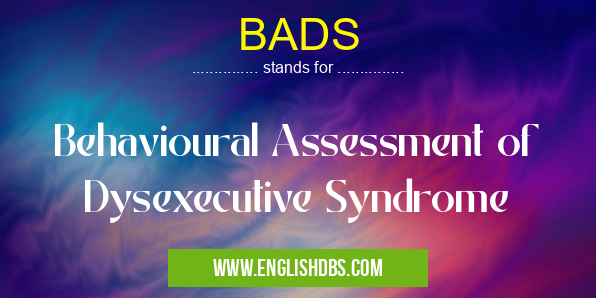What does BADS mean in SYNDROMES
BADS stands for Behavioural Assessment of Dysexecutive Syndrome. It is a comprehensive neuropsychological assessment battery designed to evaluate individuals suspected of having dysexecutive syndrome, a neurocognitive disorder characterized by difficulties with executive functions.

BADS meaning in Syndromes in Medical
BADS mostly used in an acronym Syndromes in Category Medical that means Behavioural Assessment of Dysexecutive Syndrome
Shorthand: BADS,
Full Form: Behavioural Assessment of Dysexecutive Syndrome
For more information of "Behavioural Assessment of Dysexecutive Syndrome", see the section below.
What is Dysexecutive Syndrome?
Dysexecutive syndrome refers to a range of cognitive impairments that affect an individual's ability to plan, organize, and execute goal-directed behaviors. It can result from damage to the frontal lobes of the brain, which are responsible for higher-level cognitive functions.
BADS Assessment
The BADS assessment battery is a standardized tool that provides a detailed assessment of various executive functions, including:
- Planning and Problem-Solving: Ability to develop and implement strategies to achieve goals.
- Initiation and Perseverance: Ability to start and sustain tasks despite distractions or difficulties.
- Working Memory: Ability to hold and manipulate information in mind over short periods.
- Attention and Concentration: Ability to focus and maintain attention on relevant stimuli.
- Cognitive Flexibility: Ability to adapt to changing task demands and switch between different perspectives.
- Response Inhibition: Ability to control impulsive behaviors and override inappropriate responses.
Essential Questions and Answers on Behavioural Assessment of Dysexecutive Syndrome in "MEDICAL»SYNDROMES"
What is the Behavioural Assessment of Dysexecutive Syndrome (BADS)?
BADS is a standardized assessment that helps healthcare professionals evaluate the cognitive and behavioral symptoms associated with Dysexecutive Syndrome. It is used to diagnose and monitor individuals with conditions that affect the frontal lobe of the brain, such as traumatic brain injury, dementia, and attention deficit hyperactivity disorder (ADHD).
What does BADS assess?
BADS measures various aspects of executive functioning, including:
- Planning and organization
- Self-monitoring
- Flexibility
- Working memory
- Inhibition
- Attention
How is BADS administered?
BADS is typically administered by a healthcare professional, such as a neuropsychologist or occupational therapist. It involves a combination of clinician observation, self-report questionnaires, and performance-based tasks.
Who is BADS appropriate for?
BADS is suitable for individuals aged 16 years and older who are suspected of having Dysexecutive Syndrome or other conditions that affect executive functioning. It can also be used for research purposes and to track changes over time.
What are the benefits of using BADS?
BADS provides a comprehensive assessment of executive functioning, aiding in:
- Accurate diagnosis of Dysexecutive Syndrome
- Identification of specific areas of cognitive impairment
- Monitoring of treatment progress and response
- Development of tailored rehabilitation plans
How can I access BADS?
BADS is a copyrighted assessment tool and is only available through authorized distributors or by referral from a healthcare professional.
Final Words: The BADS assessment battery is an essential tool for diagnosing and evaluating dysexecutive syndrome. It provides clinicians with a comprehensive understanding of an individual's cognitive strengths and weaknesses, allowing them to develop appropriate interventions and support strategies.
